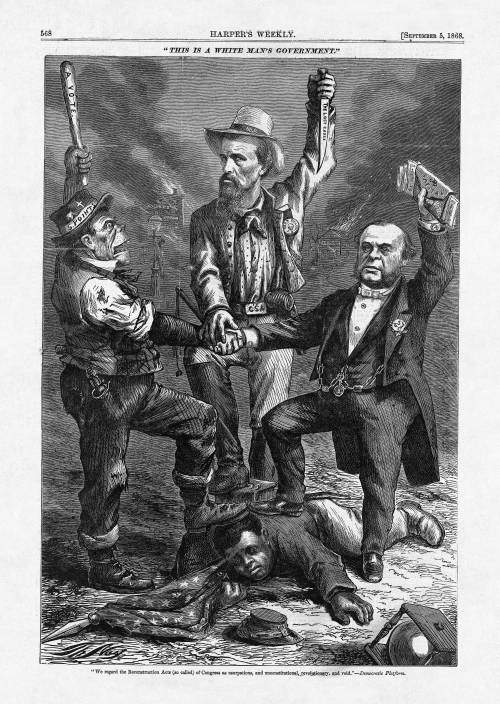We are still under the Martial Law Rule of the Civil War.
After the Civil War hostilities, the 14th amendment used Martial Law Rule to create a new type of citizenship. It allowed the slaves that were freed by the 13th amendment to apply for federal benefits from the Freedman’s Bureau. Less than 1% of the freed slaves applied because they knew welfare would forfeit their rights. Everyone knew the maxim of law: “The civil laws reduce an ungrateful freedman to his original slavery” Libertinum ingratum leges civiles in pristinam servitutem redigunt. Every Law Dictionary will tell you this.
Ignorance of the law is no excuse.
Here is a commentary on the 1868 Democratic Party platform. (President Andrew Johnson was a good ol’ boy Democrat. They wanted the freed slaves to stay on the Democrat plantation.)

[“This Is a White Man’s Government,” political cartoon by Thomas Nast, published in Harper’s Weekly, September 5, 1868. Depicted standing atop a black Civil War veteran with a ballot box are a “Five Points Irishman,” Ku Klux Klan founder Nathan Bedford Forrest, and Wall Street financier and Democrat August Belmont.]
BORN OR NATURALIZED IN THE UNITED STATES
In 1941, the US Supreme Court in Edwards v. California 314 US 172 at the bottom of page 183: “birth within a state does not establish citizenship thereof.”
That’s right. Your natural birth does not establish state citizenship. Or federal citizenship.
Federal benefits are not available to state inhabitants. State inhabitants are not subject to federal laws, except for the three crimes mentioned in the constitution.
If you apply for federal benefits, you are subject to the jurisdiction thereof.
SUBJECT TO THE JURISDICTION THEREOF
Notice in the Constitution that the 13th amendment freed the slaves. It uses the phrase “subject to their jurisdiction” (plural). But the 14th amendment only refers to one singular (federal) jurisdiction “subject to the jurisdiction”.
Notice in the U.S. Constitution, that the word Citizen is always capitalized prior to the 14th Amendment. And lower case thereafter. There are two citizenships: state and federal. Congress did not forget how to use the English language.
In the Supreme Court case Elk v. Wilkins, 112 U.S. 94 it was determined that Native American Mr. Elk was not subject to federal laws. They would not let him pay taxes or vote.
The U.S. Supreme Court in Elk v. Wilkins (112 U.S. 94) in 1884, 16 years after the 14th Amendment authorized federal welfare to those “born or naturalized in the United States” and 14 years after the 15th Amendment granted the right to vote without account of race, determined:
“The persons declared to be citizens are `all persons born or naturalized in the united states, and subject to the jurisdiction thereof.’ The evident meaning of these last words is, not merely subject in some respect or degree to the jurisdiction of the United States, but completely subject to their political jurisdiction, and owing them direct and immediate allegiance.”
That’s right. The 14th amendment phrase “born or naturalized in the United States and subject to the jurisdiction thereof” only refers to those who are born or naturalized in the government that is named “the United States”.
The State Constitutions are different than the Federal Constitution. You must voluntarily submit yourself to two different governments. The 14th Amendment citizen cannot complain because he has voluntarily submitted himself. (we will study this in the next lesson)
We hold the truth that all men are created equal. You remain equal until you consent to be governed. Did you consent to be governed?
Under the U.S. Constitution, Vice President Thomas Jefferson reassured the people of Kentucky that they are subject to only the three federal laws. Those are the three crimes that are mentioned in the Constitution, “and no other crimes whatever“.
Unfortunately for most people, getting a SSN makes you subject to federal laws, even if you were never a socialist.
The Social Security Act, Section 205(c)(2)(B)(i)(II), requires applicants for Social Security Numbers to be an “applicant for or recipient of benefits under any program financed in whole or in part by Federal funds”.
This is the only reason congress allows them to be issued. But it is not even the government that issues them.
Then in 1941, six years after the Social Security Act, we found out who qualifies for welfare.
U.S. Supreme Court in Edwards v. California 314 US 172: “…only persons who are presently destitute of property and without resources to obtain the necessities of life, and who have no relatives or friends able and willing to support them.”
Busser v. Snyder, 282 Pa. 440, 128 A. 80 (1925) (also 37 ALR 1515):
• “An Old Age Assistance Law is prohibited by a constitutional provision that no appropriation shall be made for charitable or benevolent purposes to any person.”
• “The term ‘poor,’ as used by lawmakers, describes those who are destitute and helpless, unable to support themselves, and without means of support.”
• And they still have the same rights as a fugitive.
And notice that the Income Tax Regulations, right up front of the first book, (so you don’t have to search through all 20 books) Title 26 Code of Federal Regulations section 1.1-1 defines what kind of citizen is subject to the tax code.

It tells us who is subject to the jurisdiction thereof.
It uses the exact words of the 14th Amendment.
As you can see for yourself, the Fourteenth Amendment is a necessary element of the Federal Income Tax imposed under the Sixteenth Amendment. It only applies to 14th Amendment citizens.
What did you sign to change your citizenship?